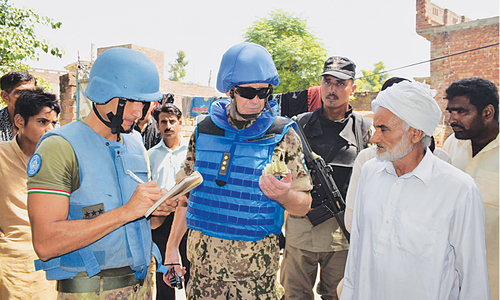INDIA’s summary rejection of the UN human rights report on Kashmir has predictably found allies in the opposition parties, chiefly the Congress.
This is partly because the Congress party is crammed with nationalists who are difficult to differentiate from the ruling Bharatiya Janata Party. Also the subject of discussing military in a critical light is treated like a hot potato. With the general elections looming less than a year away any acceptance of criticism of state institutions is deemed risky.
According to the UN report, the Indian government steadfastly refused to allow UN rights observers into Jammu and Kashmir. When they approached Pakistan to visit Azad Kashmir to monitor their side of rights abuses, they were told it was fine provided they first got permission from the Indians to visit the part of Kashmir held by them.
There was one occasion people remember when the late Asma Jahangir was permitted to visit the strife-torn region to monitor the situation there.
As a general rule foreign observers are barred from visiting the area to monitor abuses.
I asked the spokesperson of the Concerned Citizens Group, a motley group of former ministers, officers and officials who have been reporting from Kashmir what their reaction to the UN report was. They said they were still studying it. There’s very little to study. There are facts one can question or feel embarrassed or angry about.
The rejection of the report in order to pander to some lingering or robust nationalist sentiments underscores the need for politicians like Bernie Sanders and Jeremy Corbyn to emerge from the ranks of Indian and Pakistani leadership so as to cast a self-critical look at the state of affairs in their respective regions.
The Congress and the left offer that possibility in India but they seem to be too wrapped in real or imagined history to divine the difference between truth and charade.
Simply put, the UN report starts with an overview of the effect of the killing of 22-year-old Burhan Wani in July 2016. The report described him as a leader of Hizbul Mujahideen, an armed group. What is there to contest in it?
The report speaks of how the incident set off “protests against his killing on a very large and unprecedented scale throughout the Kashmir Valley and in districts of Jammu”. Is that factually incorrect?
It says Indian security forces responded to protests with force, which led to casualties and a wide range of alleged human rights violations throughout the summer of 2016 and into 2018.
Right or wrong?
“While Indian-administered Kashmir has experienced waves of protests in the past — in the late 1980s to early 1990s, 2008 and 2010 — this current round of protests appears to involve more people than the past, and the profile of protesters has also shifted to include more young, middle-class Kashmiris, including females who do not appear to have been participating in the past.”
Some of the root causes of the discontent fuelling protesters are addressed in the disputed report.
“Shortly after the outbreak of violence, the High Commissioner for Human Rights met the representatives of the Governments of Pakistan and India who had differing narratives about the ongoing events and the general situation in Kashmir.
"From July 2016, the High Commissioner for Human Rights has, on numerous occasions, requested the Governments of India and Pakistan that his Office be given unconditional access to Kashmir to assess the human rights situation. India rejected this request while Pakistan offered access should the Office obtain access to India-administered Kashmir.
"Without unconditional access to Kashmir on either side of the Line of Control, the Office of the United Nations High Commissioner for Human Rights (OHCHR) has undertaken remote monitoring of the human rights situation.”
This is the first report on the situation of human rights in both IHK and Azad Jammu and Kashmir.
On the Indian side, the report covers Jammu and Kashmir, consisting of the Kashmir Valley, the Jammu and Ladakh regions.
On Pakistan’s side, it covers Azad Jammu and Kashmir and Gilgit-Baltistan. India has used this to point to Pakistan’s occupation of the region without acknowledging its own occupation. The focus of the report is on the situation of human rights in India-held Kashmir from July 2016 to April 2018 “over which period allegations of widespread and serious human rights violations were received, notably excessive use of force by Indian security forces that led to numerous civilian casualties”.
Should the Congress party dispute that in responding to demonstrations that started in July 2016, as the report says, “Indian security forces used excessive force that led to unlawful killings and a very high number of injuries”.
It quoted civil society estimates as saying that 130 to 145 civilians were killed by security forces between mid-July 2016 and end of March 2018, and 16 to 20 civilians were killed by armed groups in the same period.
“One of most dangerous weapons used against protesters during the unrest in 2016 was the pellet-firing shotgun, which is a 12-gauge pump-action shotgun that fires metal pellets.” What is the dispute here? If the numbers seem exaggerated discuss it, refute it.
Take a look: What pellet guns have done to protesters in Kashmir
That’s what happens in parliaments where leaders like Corbyn and Sanders keep the vigil.
In the same context, the report says, since the late 1980s, a variety of armed groups have been actively operating in the IHK, and there has been documented evidence of these groups committing a wide range of human rights abuses, including kidnappings and killings of civilians and sexual violence. Should the government of India be refuting this?
Published in Dawn, June 16th, 2018














































